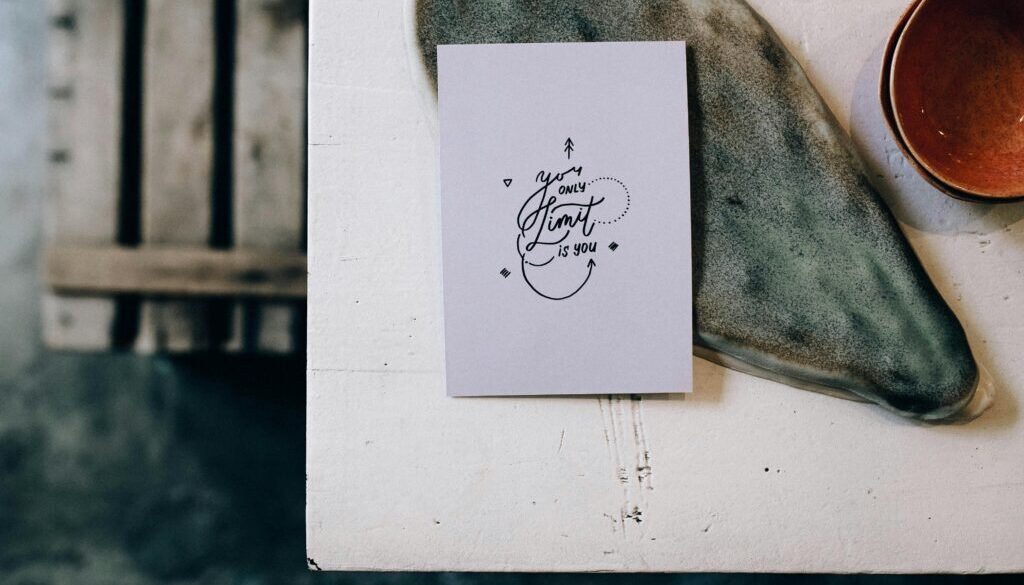Change Your Beliefs, Change Your Life: Overcoming Self-Imposed Limits
I’m addressing this early on because it’s poetic as a starting point.
Procrastination. There’s too much in the way. Too much at stake.
Too many voices saying, “Don’t bother,” “You’ll make a fool of yourself,” “You can start, but you won’t be consistent,” “It’s too much work,” and it goes on and on.
Have you ever stared into the vast, infinite uncertainty of the future and felt a bit terrified?
It’s scary doing something new because new is different, and different is scary.
So here it is. Here’s my chance to break through my own ideas of what’s possible for me, and maybe this post will convince you to break through some of your own heavy voices.
What Are Beliefs Anyway?
We need beliefs because life is so big and vast and crazy. We cannot handle reality in all its complexity, or at least, we can’t make sense of it all at once.
Our beliefs are things we’ve learned about reality that streamline the whole living process. Imagine needing to learn that gravity exists every day, or how to socialize anew each time. It would take so much bandwidth. No thanks.
So thank you, brain, for creating this simplified model of life so I can chill.
It’s great—until it isn’t.
Your moment-by-moment thoughts exert a powerful healing effect on the brain … or they can work to your detriment.
—Joe Dispenza, Breaking the Habit of Being Yourself
By definition, most of our beliefs are prejudices. We don’t have to try everything to judge something. We create an avatar, an archetype, or a model of something, and it becomes concrete for us.
But prejudice means we might miss something or misjudge something, and we absolutely will judge it before we experience it.
Then there are ideas we have about life that perhaps were true, at least in part, but now they are not.
•“I’m ugly”—by whose standards? You learned this when you were bullied. Not true or helpful.
“People are untrustworthy”—maybe your trust was broken in big ways, but is this generalization true? More importantly, is it helpful?
“I’m not a good person”—who would be, by the harsh standards you set for yourself?
Every idea and belief you have could be reduced to nothing because they are only beliefs. The problem comes back around: once you feel your beliefs are threatened, you get feisty. Why? Because it’s scary.
So we tend to hold closely to our beliefs as if they are our connection to reality itself.
But they need to be challenged. It’s humbling to accept a challenge head-on.
Are you ready?
Assessing Our Beliefs
How do we assess our beliefs about ourselves? Well, this example might help:
Remember Moses believed he couldn’t go back to Egypt and be a leader. (From Exodus 3). God believed he could. Who was right?
‘O Lord, I’m not very good with words. I never have been, and I’m not now, even though you have spoken to me. I get tongue-tied, and my words get tangled!’
— Moses, Exodus 4:10
So what is reality—God, life, the universe—calling you to address in your life?
Moses came up with all these excuses.
All beliefs have legs, like a table—supporting pillars. “I’m not the guy for the job because of this, that, and yes, that too…”
But bit by bit, his limiting beliefs crumbled.
Moses moved into a new role that he was perfect for. He became a legend.
There is a lot more in him than you guess, and a deal more than he has any idea of himself.
—JRR Tolkien, The Hobbit
It took Moses a personal catastrophe reduce him to a lowly shepherd.
It took Moses a conversation with God Himself to rebuild him.
Breaking Through
So try this: What in your life are you putting off? What are other people expecting of you? What keeps coming back as a struggle dressed in different clothes?
And be patient with how you respond. Keep going deeper.
“I’ve not started my business because thinking about it gives me anxiety.”
Why? Because there’s insecurity!
Why? Because I don’t believe I am good enough and that I will fail and waste time!
Ah, there we are.
Now you can see yourself better.
“I am not enough.”
You can gently begin to challenge it!
Affirming What You Believe
This is very simple.
Just say the opposite. Out loud. To yourself.
“I am enough.”
In time, this might send ripples through your soul. True, you may not feel it.
That’s called an affirmation—affirming a truth.
Remember, these limiting beliefs are imprinted deep.
Saying it once won’t be enough.
An affirmation can be anything you want it to be, but a few simple says to make them effective:
- It must be something that you actually believe in, at least in some way.
- Speak it with emotion
- Repeat it. Everyday.
Get clear on what you truly want, condition yourself to the belief that it’s possible by focusing on and affirming it every day, and then consistently move in the direction of your vision until it becomes your reality.
— Hal Elrod, The Miracle Morning
Welcome the challenge.
Change your beliefs, change your life.
“Whether you think you can or think you can’t, you’re right either way.”
—Henry Ford.
So you might as well think you can…
Moses had a complicated life before God challenged him.
So have you.
So what do you want your life to look like?
Psycheverse: “You will know the truth, and the truth will set you free.”
—John 8:32)


